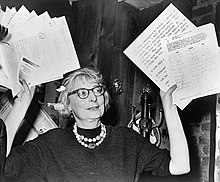
Back جاين جاكوبز Arabic جاين جاكوبز ARZ Ceyn Cekobs AZ Jane Jacobs Catalan Jane Jacobsová Czech Jane Jacobs Danish Jane Jacobs German Jane Jacobs EO Jane Jacobs Spanish Jane Jacobs EU
Jane Jacobs | |
|---|---|
 Jacobs as chair of a Greenwich Village civic group at a 1961 press conference | |
| Born | Jane Isabel Butzner 4 May 1916 |
| Died | 25 April 2006 (aged 89) Toronto, Ontario, Canada |
| Occupations |
|
| Employers | |
| Organizations |
|
| Notable work | The Death and Life of Great American Cities (1961) |
| Spouse |
Robert Jacobs (m. 1944) |
| Awards | Vincent Scully Prize (2000) |
Jane Isabel Jacobs[1] OC OOnt (née Butzner; 4 May 1916 – 25 April 2006) was an American-Canadian journalist, author, theorist, and activist who influenced urban studies, sociology, and economics. Her book The Death and Life of Great American Cities (1961) argued that "urban renewal" and "slum clearance" did not respect the needs of city-dwellers.[2][3]
Jacobs organized grassroots efforts to protect neighborhoods from urban renewal and slum clearance, in particular plans by Robert Moses to overhaul her own Greenwich Village neighborhood. She was instrumental in the eventual cancellation of the Lower Manhattan Expressway,[4] which would have passed directly through the area of Manhattan that would later become known as SoHo, as well as part of Little Italy and Chinatown.[5] She was arrested in 1968 for inciting a crowd at a public hearing on that project.[6] After moving to Toronto in 1968, she joined the opposition to the Spadina Expressway and the associated network of expressways in Toronto that were planned and under construction.[7][8]
As a woman and a writer who criticized experts in the male-dominated field of urban planning,[9][10] Jacobs endured scorn from established figures.[who?] Routinely, she was described first as a housewife,[11] as she did not have a college degree or any formal training in urban planning; as a result, her lack of credentials was seized upon as grounds for criticism.[12][13] The influence of her concepts eventually was acknowledged by highly respected professionals, such as Richard Florida and Robert Lucas.[14]
- ^ https://www.thecanadianencyclopedia.ca/en/article/jane-isabel-jacobs
- ^ Douglas, Martin (26 April 2006). "Jane Jacobs, Urban Activist, Is Dead at 89". The New York Times. Retrieved 17 February 2016.
- ^ Jacobs, Jane. The Death and Life of Great American Cities. p. 138.
If self-government in the place is to work, underlying any float of population must be a continuity of people who have forged neighborhood networks. These networks are a city's irreplaceable social capital. Whenever the capital is lost, from whatever cause, the income from it disappears, never to return until and unless new capital is slowly and chancily accumulated.
- ^ Wainwright, Oliver (30 April 2017). "Street fighter: how Jane Jacobs saved New York from Bulldozer Bob". The Guardian. ISSN 0261-3077. Retrieved 22 January 2020.
- ^ Halle, David (2003). New York & Los Angeles: Politics, Society, and Culture. University of Chicago Press. p. 16. ISBN 9780226313702.
This ten-lane highway, to have been lined with huge apartment towers, would have cut Manhattan in two from east to west and wiped out the entire neighborhood that later became known as Soho and, also, much of neighboring Little Italy and Chinatown.
- ^ Lawson, Wayne (14 April 2017). "The Woman Who Saved New York City from Superhighway Hell". Vanity Fair. Retrieved 22 January 2020.
- ^ "The places that mattered to Jane Jacobs". Retrieved 22 January 2020.
- ^ Milligan, Ian (2011). "'This Board Has a Duty to Intervene': Challenging the Spadina Expressway through the Ontario Municipal Board, 1963-1971". Urban History Review / Revue d'histoire urbaine. 39 (2): 25–39. doi:10.7202/1003460ar. ISSN 0703-0428. JSTOR 43562363. S2CID 144671198.
- ^ "Urban Planning Has a Sexism Problem". nextcity.org. Archived from the original on 9 November 2021. Retrieved 22 January 2020.
- ^ Gratz, Roberta Brandes. "Jane Jacobs and the Power of Women Planners". CityLab. Archived from the original on 20 March 2014. Retrieved 22 January 2020.
- ^ Laurence, Peter L. (21 January 2016). Becoming Jane Jacobs. Philadelphia: University of Pennsylvania Press. ISBN 978-0-8122-4788-6. OCLC 911518358.
- ^ "Jane Jacobs". The Center for the Living City. Retrieved 11 March 2020.
- ^ "The death and life of Jane Jacobs critiques". globalurbanist.com. 24 May 2011. Retrieved 11 March 2020.
- ^ Why Creativity is the New Economy – Richard Florida, 26 September 2012, retrieved 16 November 2021